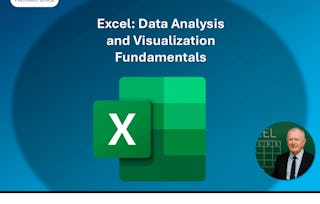As data becomes the modern currency, so the ability to analyse the data quickly and accurately has become of paramount importance. Excel with its extraordinarily broad range of features and capabilities is one of the most widely used programs for doing this. In the first course of our Excel Skills for Data Analysis and Visualization Specialization, you will learn the fundamentals of Excel for data analysis. When you have completed the course, you will be able to use a range of Excel tools and functions to clean and prepare data for analysis; automate data analysis with the help of Named Ranges and Tables; and use logical and lookup functions to transform, link and categorise data.

Excel Fundamentals for Data Analysis

Excel Fundamentals for Data Analysis
This course is part of Excel Skills for Data Analytics and Visualization Specialization


Instructors: Nicky Bull
220,887 already enrolled
Included with
4,263 reviews
What you'll learn
Use Excel tools and functions to clean and prepare data for analysis.
Use Named Ranges and Tables to automate your analysis.
Understand the different types of data in Excel and use appropriate functions to work with them.
Use logical and lookup functions to transform, link and categorise data.
Skills you'll gain
Details to know

Add to your LinkedIn profile
31 assignments
See how employees at top companies are mastering in-demand skills

Build your subject-matter expertise
- Learn new concepts from industry experts
- Gain a foundational understanding of a subject or tool
- Develop job-relevant skills with hands-on projects
- Earn a shareable career certificate

There are 6 modules in this course
In this module, you will explore how to use Excel's powerful text functions to clean and manipulate data, ensuring that it’s in the right format for analysis. Mastering these functions will allow you to transform unstructured data into actionable insights.By the end of this module, you will be an expert in Excel's Text functions. This module discusses ways you can extract information and manipulate data to fulfil specific business requirements. You will develop techniques for working confidently with these Excel functions and unlock the full power of Excel by manipulating and cleaning text data. This is really important because you cannot properly analyse data if it is invalid or in an unsuitable format. You will begin with the mechanics of creating a function, specifying multiple arguments, and then you will look at how to work with text in functions. You will also learn how to use multiple functions in a single formula — a technique known as nesting. The topics you will be learning this week: Functions for Combining Text; Functions for Splitting Text; Combining Text Functions; Cleaning Data & Changing Case; and Removing and replacing unwanted characters.
What's included
7 videos7 readings6 assignments
By the end of this module, you will be an expert in Excel's Date functions. This module discusses ways that you can extract information and manipulate data to fulfil specific business requirements. You will also be looking at functions for converting data types: such as text to numbers, dates to text, and then both numbers and text to dates. You will learn to solve the problem of data not being in the correct format, and you will learn how to perform arithmetic operations with dates like you would with numbers, as well as performing calculations with dates. You will also learn some really great functions specifically for solving day-to-day tricky date problems that are required in business such as the WORKDAY, EDATE and EOMONTH functions. The topics you will be learning this week: Converting Data Types; Understanding dates and basic date functions; Generating valid dates; Calculating days between two dates; and Calculating dates from a given date.
What's included
6 videos3 readings6 assignments
In this module, you will learn about different types of cell referencing: relative cell referencing, absolute cell referencing, and mixed cell referencing. You will then learn about a great Excel functionality, Named Ranges — which is another way of referencing a cell or a range of cells by giving them a sensible name. You will see that named ranges make our formulas much easier to understand and you will also see how it makes them much easier to create — using tools such as Define Name and Create from Selection. You will also learn about Excel's Name Box and the Name Manager. You will learn some exciting Excel functions that allow you to aggregate and summarise data — such as SUMIFS and COUNTIFS, and much more. The topics you will be learning this week: Cell referencing and naming; Creating named ranges; Managing named ranges; Calculations with named ranges; and Automating processes with named ranges.
What's included
6 videos3 readings6 assignments
In this module, you will learn that a table in Excel is more like a database of records and fields which contains a set of related information — such as a table of inventory data. You will learn how to create, format, and manage tables, and you will learn how to easily format, select, sort, and filter in a table. You will also learn about the Total Row where you can just pick from a set of automated summarisation functions. You will learn about structured referencing — where you can continue to work with the data in a table, but the formulas look slightly different because tables use a different way to reference cells. You will also learn how to automatically extend tables whenever new data is added. The topics you will be learning this week: Creating, naming and removing tables; Formatting and selecting in tables; Sorting and filtering tables; Performing calculations with structured references; and Automating processes with tables.
What's included
6 videos3 readings6 assignments
You will learn two great Excel skills in this week’s module — first, you will learn about conditional logic, and second, you will learn about automating lookups. The two of these tools together will push your data analytics to the next level! Excel has several logical functions and this module explores some of them, such as AND, OR, and IF. You will start by learning the concept of conditional logic, and how conditional logic works in Excel formulas. You will then learn to conduct logic tests and use conditional operations. For more complex logic tree scenarios, you will learn how to use nested IF functions to evaluate data. You will then learn about lookup functions — these are widely used in data analytics for connecting data sets as well as error checking. You will learn about one of the most widely used lookup functions in business — VLOOKUP, as well as other lookup functions such as INDEX and MATCH, as well as Excel newest lookup function — XLOOKUP. The topics you will be learning this week: Performing logical operations with IF; Applying advanced logical operations; Categorising data with VLOOKUP; Matching data with VLOOKUP and XLOOKUP; and Advanced data matching with INDEX and MATCH.
What's included
6 videos3 readings6 assignments
This is the final assessment of the course and it is worth 25% of your total grade. As this is the final assessment, it requires you to demonstrate the learning objectives from each of the weeks — and thus requires you to demonstrate all the learning objectives of the entire course.
What's included
1 assignment
Earn a career certificate
Add this credential to your LinkedIn profile, resume, or CV. Share it on social media and in your performance review.
Instructors


Offered by
Explore more from Data Analysis
 Status: Free Trial
Status: Free TrialLogical Operations
 Status: Free Trial
Status: Free TrialCorporate Finance Institute
 Status: Free Trial
Status: Free Trial Status: Free Trial
Status: Free Trial
Why people choose Coursera for their career

Felipe M.

Jennifer J.

Larry W.

Chaitanya A.
Learner reviews
- 5 stars
82.10%
- 4 stars
15.17%
- 3 stars
1.64%
- 2 stars
0.21%
- 1 star
0.86%
Showing 3 of 4263
Reviewed on Aug 4, 2020
I enjoyed the course, but since I do not use excel on a regular basis I found it very hard.I will use the leaned functions as much as I can apply to my excel projects.Thanks for an interesting time.
Reviewed on Dec 3, 2023
This is the best course I have seen in excel fundamentals on any platform. Easy to follow, many practice tests, spreadsheets and useful cheatsheets. Kudos to the instructors and Macquarie University.
Reviewed on Dec 4, 2021
Super fun and and intellectual course. Real need of hour to excel in Excel :) . This course helped a lot, in improving skills in excel analytics.special thanks to both the instructors !!!!!!!

Open new doors with Coursera Plus
Unlimited access to 10,000+ world-class courses, hands-on projects, and job-ready certificate programs - all included in your subscription
Advance your career with an online degree
Earn a degree from world-class universities - 100% online
Join over 3,400 global companies that choose Coursera for Business
Upskill your employees to excel in the digital economy
Frequently asked questions
To access the course materials, assignments and to earn a Certificate, you will need to purchase the Certificate experience when you enroll in a course. You can try a Free Trial instead, or apply for Financial Aid. The course may offer 'Full Course, No Certificate' instead. This option lets you see all course materials, submit required assessments, and get a final grade. This also means that you will not be able to purchase a Certificate experience.
When you enroll in the course, you get access to all of the courses in the Specialization, and you earn a certificate when you complete the work. Your electronic Certificate will be added to your Accomplishments page - from there, you can print your Certificate or add it to your LinkedIn profile.
Yes. In select learning programs, you can apply for financial aid or a scholarship if you can’t afford the enrollment fee. If fin aid or scholarship is available for your learning program selection, you’ll find a link to apply on the description page.
More questions
Financial aid available,

